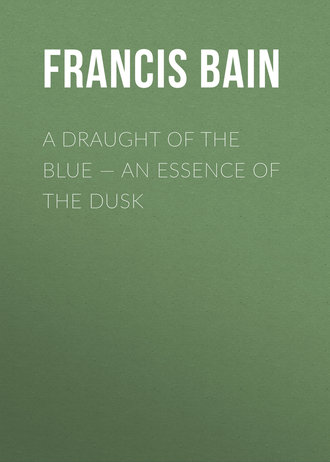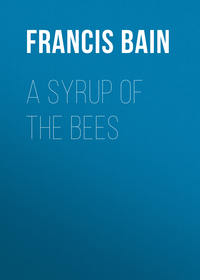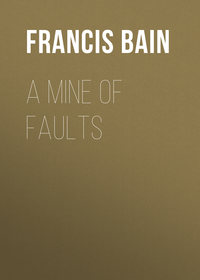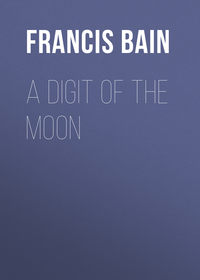 полная версия
полная версияA Draught of the Blue – An Essence of the Dusk
And then, that happened which I had foreseen. We had not gone a mile upon our homeward way, when one of the horses fell. Therefore, disregarding the asseverations of my rascally Jehu that the remaining animal was fully equal to the task alone, I descended, and proceeded on foot. But a ten-mile walk on the Delhi plain in the hottest part of the day is not a thing to be recommended. After plodding on for about two hours, I was, like Langland, "wery forwandred," and went me to rest, not alas! by a burnside, but in the shadow of one of the innumerable little tombs that stand along the dusty road. There I lay down and fell asleep.
Nothing induces slumber like exertion under an Indian sun. When I awoke, that sun was setting. A little way before me, the yellow walls of Delhi were bathed in a ruddy glow; the minarets of the Great Mosque stood out sharp against the clear unspotted amber sky. And as I watched them, I suddenly became aware that I was myself observed with interest by a dusky individual, who was squatted just in front of me, and who rose, salaaming, when he saw that I was awake. It appeared that I had, so to say, fallen into a "nest of vipers "; that I had unwittingly invaded the premises of a snake dealer, who, no doubt for solid reasons, had made my friendly tomb the temporary repository of his stock-in-trade.
The Indian snake charmer, gáruda, hawadiga,36 or whatever else they call him, is as a rule but a poor impostor. He goes about with one fangless cobra, one rock snake, and one miserable mongoose, strangling at the end of a string. My dweller in tombs was richer than all his tribe in his snakes, and in his eyes. I have never seen anybody else with real cat's eyes: eyes with exactly that greenish yellow luminous glare which you see when you look at a cat in the dark. They gleamed and rolled in the evening sun, over a row of shining teeth, as their owner squatted down before me, liberating one after another from little bags and baskets an amazing multitude of snakes, which he fetched in batches from the interior of the tomb, till the very ground seemed alive with them.37 Some of them he handled only with the greatest respect, and by means of an iron prong. Outside the Zoo (where they lose in effect) I never saw so many together before: and it is only when you see a number of these reptiles together that you realise what a strange uncanny being, after all, is a snake: and as you watch him, lying, as it were, in wait, beautiful exceedingly, but with a beauty that inspires you with a shudder, his eyes full of cruelty and original sin, and his tongue of calumny and malice, you begin to understand his influence in all religions. I was wholly absorbed in their snaky evolutions, and buried in mythological reminiscences, when my gáruda roused me suddenly, by saying: Huzoor, look!
He leaned over, and administered with his bare hand a vicious dig to a magnificent hamadryad that lay coiled upon itself in its open basket. The creature instantly sat up, with a surge of splendid passion, hissing, bowing, and expanding angrily its great tawny hood. The gáruda put his púngí to his lips, and blew for a while upon it a low and wheezy drone, – the invariable prelude to a little jadoo, or black art, – which the beautiful animal appeared to appreciate: and then, pointing with the end of his pipe to the "spectacles" on its hood, he said, with that silky, insinuating smile which is characteristic of the scamp: Huzoor, dekko, namas karta38: —
Nágki phani, chánd ka dúkhUski badi, áp ka súkh.39I did not understand his lunar allusion, but, judging that his rhyming gibberish, like that of the rascally priests in Apuleius, was a carefully prepared oracle of general application, kept in stock for the cozening of such prey as myself, I repeated to him my favourite Hindu proverb,40 and gave him in exchange for his benevolent cheque on the future, a more commonplace article of present value, which led to our parting on the most amicable terms. But I did him injustice, perhaps. Long afterwards, having occasion to consult an astronomical chart, with reference to this very story, all at once I started, and in an instant, the golden evening, the walls of Delhi, and my friend of the many snakes and sinister eyes, suddenly rose up again into my mind. For there, staring at me out of the chart, was the mark on the cobra's head. It is the sign still used in modern astronomy for "the head and tail of the dragon," the nodes indicating the point of occultation, the symbol of eclipse.
What then induced or inspired the gáruda to connect me with the moon? Was it really black art, divination, or was it only a coincidence? Reason recommends the latter alternative: and yet, the contrary persuasion is not without its charm. Who knows? It may be that the soul grows to its atmosphere as well as the body, and living in a land where dreams are realities, and all things are credible, and history is only a fairy tale – the land of the moon and the lotus and the snake, old gods and old ruins, former births, second sight, and idealism – it falls back, unconsciously mesmerised, under the spell of forgotten creeds.
POONA, April, 1906.
A Haunted Beauty
A Haunted BeautyMay that triumphant Lord protect us, who as he stands in mysterious meditation, bathed in twilight, motionless, and ashy pale, 41 with the crystal moon in his yellow hair, appears to the host of worshippers on his left, a woman, and to those on his right, a man.
IThere lived of old, on the edge of the desert, a rájá of the race of the sun. And like that sun reflected at midday in the glassy depths of the Mánasa lake, he had an image of himself in the form of a son,42 who exactly resembled him in every particular, except age. And he gave him the name of Aja, for he said: He is not another, but my very self that has conquered death, and passed without birth straight over into another body. Moreover, he will resemble his ancestor, and the god after whom I have called him Aja.43 So as this son grew up, his father's delight in him grew greater also. For he was tall as a shála tree, and very strong, and yet like another God of Love: for his face was more beautiful than the face of any woman, with large eyes like lapis-lazuli, and lips like laughter incarnate: so that his father, as often as he looked at him, said to himself: Surely the Creator has made a mistake, and mixed up his male and female ingredients, and made him half and half. For if only he had had a twin sister, it would have been difficult to tell with certainty which was which.
And then, when Aja was eighteen, his father died. And immediately, his relations conspired against him, led by his maternal uncle. And they laid a plot, and seized him at night, and bound him when he was asleep: for they dared not attack him when he was awake, for fear of his courage and his prodigious strength. And they deliberated over him, as he lay bound, what they should do with him: and some of them were for putting him to death, then and there. But the prime minister, who was in the plot, persuaded them to let him live, saying to himself: In this way I shall make for myself a loophole of escape, in case he should ever regain his throne.
Then in the early morning, his uncle and his other relations took him away, and laid him bound on a swift camel. And mounting others, they hurried him away into the desert, going at full speed for hours, till they reached its very heart. And there they set him down. And they placed beside him a little water in a small skin, and a little bag of corn. And his uncle said: Now, O nephew, we will leave thee, alone with thy shadow and thy life in the sand. And if thou canst save thyself by going away to the western quarter, lo! it is open before thee. But beware of attempting to return home, towards the rising sun. For I will set guards to watch thy coming, and I will not spare thee a second time.
And then, he set his left arm free, and laid beside him a little knife. And they mounted their camels, and taking his, they flew away from him over the sand, like the shadow of a cloud driven by the western wind.
So when they were gone, Aja took the knife, and cut his bonds. And he stood up, and watched them going, till they became specks on the edge of the desert and vanished out of his sight.
IIThen he looked round to the eight quarters of the world, and he looked up into the sky. And he said to himself: There is my ancestor, alone above, and I am alone, below. And he put his two hands to his breast, and flung them out into the air. And he exclaimed: Bho! ye guardians of the world,44 ye are my witnesses. Thus do I fling away the past, and now the whole wide world is mine, and ye are my protectors. And I have escaped death by a miracle, and the craft of that old villain of a prime minister, whom I will one day punish as he deserves. And now it is as though I knew, for the very first time in all my life, what it was to be alive. Ha! I live and breathe, and there before me is food and water. And now we will see which is the stronger: Death in the form of this lonely desert, or the life that laughs at his menace as it dances in my veins. And little I care for the loss of my kingdom, now that my father is dead and gone. I throw it away like a blade of grass, and so far from lamenting, I feel rather as if I had been born again. Ha! it is good to be alive, even in this waste of sand. And he shouted aloud, and called out to the sun above him: Come, old Grandfather, thou and I will travel together across the sand. And yet, no. Thou art too rapid and too fierce to be a safe companion, even for one of thine own race. So thou shalt go before me, as is due to thee, and I will follow after.
And then, he lay down on the sand, covering his head with his upper garment, and slept and waited all day long, till the sun was going down. And then he rose, and ate and drank a very little, and taking with him his skin and corn, he walked on after the sun, which sank to his rest in the western mountain. But Aja followed him all night long, with the moon for his only companion. And as he went, he saw the bones of men and camels, lying along the sand, and grinning at him as it were with white and silent laughter, as though to say: Anticipate thy fate: for but a little further on, and thou shalt be what we are now. But he went on with nimble feet, like one that hurries through the den of a sleeping hungry lion, till the sun rose at last behind him. And then again he lay down, and rested all day long, and started again at night. And so he proceeded for many days till all his water and corn were gone. And as he threw away the skin, he set his teeth, and said: No matter. I will reach the end of this hideous sand, which, like the dress of Draupadi,45 seems to roll itself out as I go across it, though I should have to go walking on long after I am dead.
And night after night he went on, growing every night a little weaker. And then at last there came a night when as he toiled along with heavy steps that flagged as it were with loaded feet, faint with hunger and burning thirst, he said to himself: I am nearly spent, and now the end is coming near, either of the sand, or of me. And then the sun rose behind him, and he looked up, and lo! it was reflected from the wall of a city before him, which resembled another sun of hope rising in the west to cheer him. And he rubbed his eyes, and looked again, saying to himself: Is it a delusion of the desert, to mock me as I perish, or is it really a true city? And he said again: Ha! it is a real city. And his ebbing strength came back to him with a flood of joy. And he stopped, and took up a little sand, and turned, and threw it back, exclaiming: Out upon thee, abode of death!46 Now, then, I have beaten thee, and thy victim will after all escape. And he hurried on towards the city, half afraid to take his eyes away from it for a single instant, lest it should disappear.
So as he drew near it, he saw a crowd upon its wall. And when he was distant from it but a little way, suddenly its great gate's mouth was thrown open, and a stream of people shot from it like a long tongue, and rapidly came towards him, so that he said to himself: Ha! then, as it seems, I am expected by the citizens of this delightful city, who are as eager to come to me as I am to get to them. And they came closer, clamouring and buzzing as it were like bees; and he looked, and lo! they were all women, and there was not a man among them all. And as he wondered, they ran up, and reached him, and threw themselves upon him like a wave of the sea, laughing and crying, and drowning him in their embraces: and they took him as it were captive, and swept him away towards the city, all talking at once, and deafening him with their joyful exclamations, paying not the least attention to anything that he tried to say. And Aja let himself go, carried away by all those women like a leaf in a rushing stream. And he said to himself, in astonishment: What is this great wonder? For all these women fight for me, as if they had never seen a man in their lives before. Where then can the men be, to whom they must belong? Or can it be that I have come to a city composed of women without a man? Have I escaped the desert only to be drowned in a sea of women? For what is the use of a single man in an ocean of the other sex? Or are they dragging me away to offer me up to the Mother,47 having sacrificed all their own husbands already? Or have I really died in the desert, and is all this only a dream of the other world? Can these be the heavenly Apsarases, come in a body to fetch me away, as if I had fallen in battle? Surely they are, for some of them are sufficiently beautiful even for Indra's hall. And anyhow, it is better to be torn to pieces by beautiful women, even if there are far too many, than to die in the desert, all alone.
So as they bore him along, chattering on like jays and cranes, he said again to the women next him: Fair ones, who are you, and where are you taking me, and why in the world are you so greatly delighted to see me? And then at last, they replied: O handsome stranger, ask nothing: very soon thou shalt know all, for we are carrying thee away to our King. And Aja said to himself: Ha! So, then, there is a King. These women have, after all, a King. Truly, I am fain to see him, this singular King of a female city. And weak as he was, he began to laugh, as they all were laughing: and so they all surged on like a very sea of laughter, through the gates of the city, and along the streets within, till they came at last to the King's palace. And all the way, Aja looked, and there was not to be seen so much as the shadow of a man in all the streets, which overflowed with women like the channel of a river in the rainy season.
Then the guards of the palace doors, who were also women, took him, and led him in; and all the women who had brought him crowded in behind. And they mounted stairs, and after a while, they entered at last a great hall, whose pillars of alabaster were reflected in its dark green crystal floor, giving it the semblance of a silent pool in which a multitude of colossal swans had buried their necks beneath the water. And there Aja found himself in the presence of the King.
And instantly, all the women screamed together: Victory to thee, Maharájá! for here have we brought thee another husband for thy lovely daughter. And Aja started. And he said to himself: Another husband! How many husbands, then, has this strange King's daughter got already? Has she an insatiable thirst for husbands, whose number I am brought to swell? So as he stood reflecting, the King leaped from his throne, and came towards him. And as Aja looked at him, he was seized with amazement greater than before. For the King resembled a very incarnation of the essence of grief, yet such that it was difficult to behold him without laughter, as if the Creator had made him to exhibit skill in combining the two. For his long thin hair was pure white, as if with sorrow, and his eyes were red, as if with weeping, and great hollow ruts were furrowed in his sunk and withered cheeks, as if the tears had worn themselves channels in which to run. And though he was tall, he was bent and old, as if bowed down by a load of care. And he tried, as if in vain, to smile, as he said in a mournful voice that quavered and cracked: O man, whoever thou art, long have I waited for thee, and glad indeed I am to see thee, and inclined to dance like a peacock at the sight of a rainy cloud.
And as he gazed upon the King, Aja was seized with sudden laughter that would not be controlled, saying within himself: Much in common they have between them, a dancing happy peacock, and this doleful specimen of a weeping King! And he laughed till tears ran down his cheeks also, as if in imitation of those of the King. And when at last he could speak, he said: O King, forgive me. For I am very weak, and have come within a little of dying in the desert. And I laughed from sheer exhaustion, and for joy to see in thy person as it were the warrant of my escape from death. Give me food, and above all, water, if thou wouldst not have me die at thy feet. And afterwards, show me, if thou wilt, thy daughter, to whom, as it seems, I am to be married whether I will or no. And the King said: O thou model of the Creator's cunning in the making of man, thy hilarity is excused. Food thou shalt have, and water, and everything else thou canst require, and that immediately. But as for my daughter, there she is before thee. And she could teach dancing even to Tumburu himself.48
IIIAnd then, as the laughter surged again in Aja's soul, saying within himself: Out on this pitiable old scarecrow of a King, whose only thought is dancing! the King turned, and stood aside. And Aja looked, and instantly, the laughter died out of his heart, which ceased as it were to beat. And he murmured to himself: Ha! this is the most wonderful thing of all. King and women and desert and all vanished out of his mind, as if the sentiment that suddenly seized it filled it so completely as to leave room for nothing else. And he stood still gazing, feeling as though he were spinning round, though he was standing still as death. For there before him stood this enigmatical King's daughter. And like her father, she also seemed an incarnation of the soul of grief, not as in his case ignominious and an object of derision, but rather resembling a heavenly drug compounded of the camphor of the cold and midnight moon, that had put on a fragrant form of feminine and fairy beauty to drive the world to sheer distraction, half with love and half with woe. For like the silvery vision of the new-born streak of that Lord of Herbs, she was slender and pale and wan, formed as it seemed of some new strange essence of pure clear ice and new dropt snow, and she loomed on the soul of Aja out of the blackness of his trance like a large white drooping lily, just seen in the gloom of an inky night. And her hair and brow were the colour of a thunder-cloud in the month of Chaitra,49 and like that cloud, the heavy sorrow hung in her great dark mournful eyes, drenching him as it were with a shower of dusky dreamy dewy beauty, and drawing him down bewitched and lost like the victim of a haunted pool into the snaky eddy of their silent unfathomable recess. And yet her deep red lips trembled, as it were on the very border of a smile, as if they were hinting against their will of a mine of laughter and subtle snares that they were not allowed to use. And she had risen up to come and meet him, yet was hanging back as if reluctant, and so she stood, all reflected in the polished floor, with her head thrown back to look at him, for she was very small, like one on the very point of imploring help, yet shrinking, as if too proud to ask it from a stranger, balanced as it were between reliance on her own pure and pleading beauty and doubtfulness of its reception. So she halted irresolute, with glorious throat that was hovering still over the swell of her lifted breasts, poised as it were on the very verge of tumultuous oscillation, like that of Rati, preparing with timidity to cast herself at the feet of the three-eyed God, to beg back the body of her burned-up husband in a passion of love-lorn tears.
And Aja stood before her, like the sea when the digit of the moon rises suddenly over its waves, stirred with a tumult of strange emotions, and yet lit by a heavenly ray, a mass of agitated darkness mixed with dancing, trembling light; all unaware that he was himself to the King's daughter exactly what she was to him, a weapon of bewilderment in the hands of the cunning god of the flowery bow, who shot him suddenly at her, like an arrow of intoxication, and pierced her through the very middle of the soft lotus of her heart.
So they two stood awhile in silence. And all at once, Aja spoke, not knowing that he spoke aloud. And he said, very slowly: How many husbands, then, have already had this lustrous beauty, who looks for all as pure and pale and undefiled as a new young delicate jasmine bud? And instantly, as if roused from sleep by his reproach, he saw the colour leap up into her cheek, and spread like dawn flushing over her burning throat and brow. And she drew a sudden breath, and her bosom heaved abruptly as if with a sob of shame. And at that moment, the voice of the King her father broke harshly into Aja's dream, saying: Alas! alas! Never a husband has had her yet, though she is now long past sixteen, and could even teach Tumburu dancing.
And then, as if the King's words had suddenly lifted a weight from his soul, Aja burst into a shout of laughter. And he tottered, as if to fall. And he caught at the old King's arm, and gripped it so that he almost screamed, exclaiming amid his laughter: Ha! King, I am also the son of a King: and now I will be thy son-in-law. And she shall have a husband at last, and teach him, if she pleases, dances that even Tumburu does not know. And with that, he fell into such a paroxysm of laughter, that weak as he was, he could not stand, but fell: and his laughing turned to sobbing. Then the King's daughter turned to her father, with an angry flush on her brow. And she said, with strong emotion: O father, wilt thou delay for ever to send for food and water? Dost thou not see that this King's son, great and powerful though he be, is weak, and it may be, perishing, before thy face, of hunger and thirst, having escaped by a miracle out of the desert to die by thy neglect?
And she clapped her hands, stamping her foot in indignation. Then the women ran, and took up Aja, and carried him away. And they bathed him, and tended him, and fed him till he was recovered: and after a while, they brought him back, into the presence of the King.
IVSo he came once more into that hall, looking like another man. And he seemed in the eyes of the King like the rising sun of his daughter's marriage, but in those of his daughter like the very God of Love, newly risen from his own ashes. And he said joyously: O King, now I am again myself: and my reason and my strength have both again returned to me. And if in their absence, I behaved strangely and without good manners, it behoves thee to lay the blame rather on the desert of sand that surrounds thy city, than on myself. For I was like one delirious, and half distracted by wonder and other feelings coming to the aid of hunger and thirst. Then he told the King his name and family, and all his story, looking all the while at the King's daughter, as she did all the while at him, with glances that resembled sighs. But as he watched her, Aja said to himself in wonder: What has happened to her, since I saw her first, and what is the matter with her, now? For her quiet grief has abandoned her, and she looks like one in a burning fever; and two red spots, like suns, burn and blaze upon her cheeks, and her great eyes shine and glow, as if there were a fire within her soul. So when he had finished his own tale, he said: Now, then, O King, I have told thee all that I have to tell. And now it is thy turn to speak. Explain to me all this wonder; for I seem to move in a maze of extraordinary events. Why are there, in thy city, no men, but only women? And what is the cause of thy grief? And, greatest wonder of all, how comes it that thou hast found a difficulty in finding a husband for this thy daughter? For, as for myself, know that, make any terms thou wilt, I am ready to marry her, blindfold, on any conditions whatever: nay, would she only be my wife, I should consider the fruit of my birth attained.





